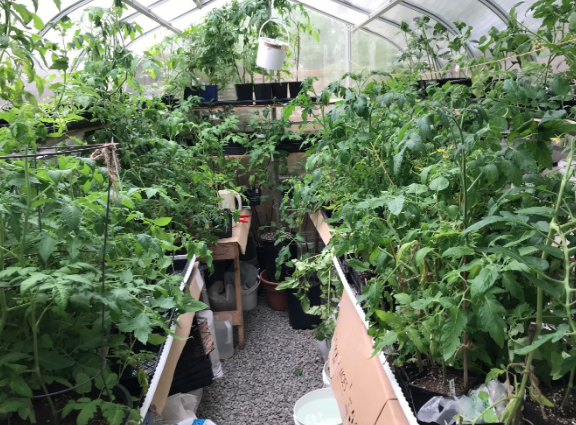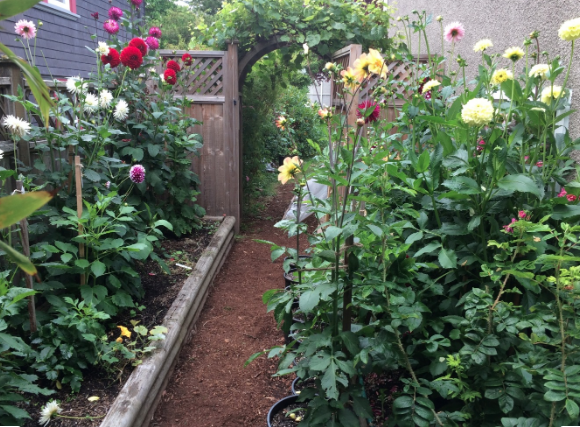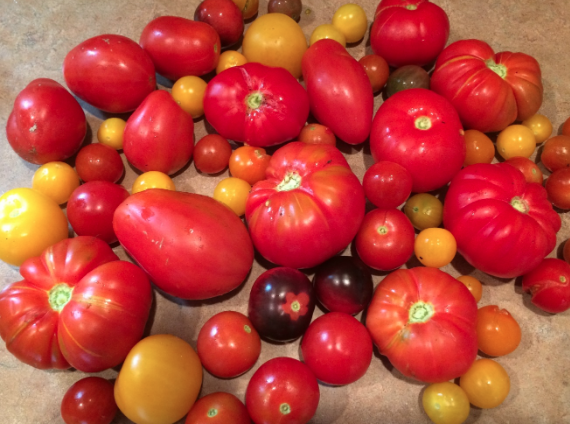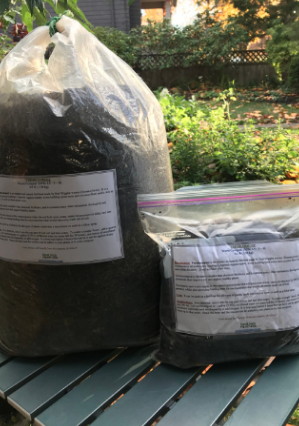- Home
- SOUL Members
- Member Profiles
- David Greig
.JPG)
David Greig Certified Organic Land Care Professional MEd, Prof. Teach. Cert., Ad. Ed. Dip. Registered Horticultural Therapist (HTR – Canada and USA) Soil Steward, Master Composter Victoria, BC |
"I live and work in Victoria, BC, which sits on the traditional unceded Coast Salish Territories of the Lekwungen People now known as the Esquimalt (Xwsepsum) and Songhees Nations. I acknowledge my privilege to have been a visitor on these lands since 1994." David Greig
1. How and when did you become interested in organic land care?
My interest in organic land care has progressed over many years. I first became aware of the notion of land care when I worked as a farm manager at an alternative school in 1976 in the vicinity of Carcross, Yukon. As we had potato and hay fields as well as livestock for our needs, (goats, chicken, pigs and rabbits), I was introduced to the ‘hows’ of growing plants without the use of chemicals. In 1987, when my partner and I had our own place in Whitehorse, I began to add back to the soil using vermicompost, compost, and growing plants without the use of chemicals. It was at this time that my life-long passion, commitment and service to organic land care began. In the 1990’s I started to work with Effective Microoganisms (EM).
2. As a Soil Steward and a vermicompost specialist, you seem to have a particular interest in soil. Why is soil so important in relation to horticulture?
I cannot say that my ideas are new, and, as a matter of fact, they are old ways of knowing and caring for the earth. Without attention to the earth, soil, nothing would live, thrive or survive. First Peoples and other earth-centred traditions revere the earth as mothers, a nurturer of all things. This is how I feel about the soil. As a mother gives birth and then tends lovingly to her offspring, so do I feel responsible for keeping soils healthy.
As a Soil Steward, I tend our urban lot as a steward who always gives back to the landscape, and, in turn, our healthy landscape gives back to us for what we want to grow. It feels like a relationship of reciprocity. When we moved in, our property was principally grass with fill as the underlayer. For 28 years I have sifted, amended, added and recycled materials into our soil. Very little vegetative material leaves our lot (except for noxious or invasive plants) and through composting and vermicomposting, I return what the remnants have grown back to our landscape.
I use composting to recycle our garden debris and vermicomposting for all of our perished kitchen material. I found vermicompost provides a material that had more nutrients, minerals and microorganisms than compost, and I use it in planting, top dressing and for making teas and brews which further support land care.
3. Can you describe any business opportunities you see related to organic land care and whether there's an increase in public support, or not, for approaches to landscaping and gardening that are more ecologically-minded?
The opportunities for organic land care will continue to grow as our climate changes. It will be necessary to work with these changes in a manner that supports local sustainability. Now more than ever, it is essential to feed the soil and to keep it healthy. Knowing one’s soil, knowing what’s in the soil and adding to the soil are knowledges and practices that help mitigate the effects of our changing climate, while at the same time providing the soil with what it needs to be healthy. Only by working with the soil in a sustainable and collaborative manner, will we create environments where the soil will give back to us what we need.
Currently, it seems that there is more interest in gardening and landscaping with ecology kept in mind. Teaching people to better understand their soil, to be curious about what is in their soil and to learn how to amend and sustain their soil are roles for the world of organic land care.
Furthermore, key factors for organic land care business opportunities entail the creation of new niches. Business opportunities that come to mind include: providing organically grown plants for landscapes, educating, assisting with and maintaining food sites, maintaining landscapes organically, supporting local neighbourhood development by reclaiming abandoned lots, making composts/vermicomposts available for landscapes, working with clients to develop ‘urban farms’, working with community groups to develop sites for teaching, learning and mentoring for populations who are socially marginalized.
4. What are some of the challenges or limitations you've faced working in this field?
Challenges for me have been the competition from products that are far cheaper than what I can offer, the lack of knowledge of the consumer and the limited qualities of product that can’t meet the demand. Additionally, because I do small batch urban farming, I am limited in the size of my operation and that to be more competitive, I would need to expand what I do. This in turn concerns me as expansion may affect the quality of my product. Understandably, people seem to be looking for the cheapest bargain.
5. Can you describe one of the most interesting projects you've worked on related to regenerative land care?
I can honestly say that our urban property has been an interesting and continual learning process. When we moved into our 1940’s stucco house in 1996, there were three small trees in our back yard: a cherry tree in the middle, a plum tree in the southeast corner and a mountain ash near the northwest corner. The rest of the landscape was grass planted on fill. Since that time, we have adhered to the doctrine of what we produce on site, we keep on site. Therefore, very little is sent off unless it is material that cannot be reused or repurposed or cannot be composted to prevent it from growing. This includes both food and plant material. I am differentiating between food from the kitchen and plant material from the garden.
We have changed our landscape by planting many different types of plants; ornamentals, grasses, bamboo, some native and food bearing plants. During our time on our landscape, every time we have planted or taken up grass, I have sifted the soil of rocks and other materials and have amended the soil with our composts, vermicompost and/or leaf mulch. The garden represents diversity on and in the soil. Although we are not certifiable as organic (e.g. fence posts are of treated lumber) everything that has been added to the soil is without chemicals and everything grown is done organically.
I say that this is the most interesting project that I have engaged in because it has illustrated to me in the long term the viability of working with a landscape organically and how even an urban environment can be an oasis of diversity.
 Photos provided by David Greig | 
|


